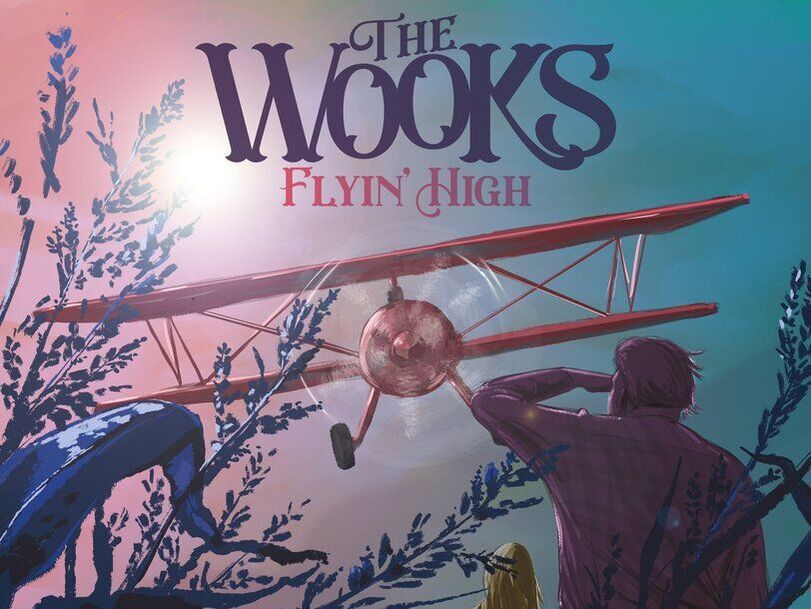The Wooks: How it Came To Be...
With all due respect to mastering engineers, it’s rare that their work is highly praised or even noticed by audiences or artists. There are even backhanded jokes made amongst musicians like “I hope so and so got his check for turning the volume up!” While quips like this might lighten the mood in a recording session, it’s undeniable that mastering is essential for making records sound their best. I have never seen this more clearly proven than on the new Wooks record “Flyn’ High”, which was mastered by veteran sound engineer Bill Wolf.
I have to admit, before we sent the mixes of “Flyn’ High” off to Bill for mastering, we were all burnt out on the record. It had been months since we started recording, and what began a joyous and creative journey had devolved into a tedious chore of culling through mixes and different edits, trying to find the ‘best” version of a song. Usually much of this work falls on the producer, but the band chose to self produce “Flyn’ High”, and therefore all the post production work was left to us to work through, without the help of an unbiased third party. We were committed to being as democratic as possible, and because of this it would sometimes take weeks for the band to settle on a particular take of a song or version of the mix.
By the time we decided to just “stick a fork in it!”, as Harry jokingly put it one day, we were all so exhausted that we were ready to just call it done, warts and all, and move on. It’s not that we weren’t proud of the record, we had just lost all perspective from listening to it so much.
I have to admit, before we sent the mixes of “Flyn’ High” off to Bill for mastering, we were all burnt out on the record. It had been months since we started recording, and what began a joyous and creative journey had devolved into a tedious chore of culling through mixes and different edits, trying to find the ‘best” version of a song. Usually much of this work falls on the producer, but the band chose to self produce “Flyn’ High”, and therefore all the post production work was left to us to work through, without the help of an unbiased third party. We were committed to being as democratic as possible, and because of this it would sometimes take weeks for the band to settle on a particular take of a song or version of the mix.
By the time we decided to just “stick a fork in it!”, as Harry jokingly put it one day, we were all so exhausted that we were ready to just call it done, warts and all, and move on. It’s not that we weren’t proud of the record, we had just lost all perspective from listening to it so much.
When CJ informed us that he had managed to get Bill Wolf (of Tony Rice “Manzanita” fame and other timeless acoustic records) to master the album, we were surprised and thrilled that he was available and interested, but admittedly did not expect mastering to make a huge difference. We figured Bill would “turn the volume up and collect his check”, but when we got the masters back from Bill, we were shocked. The tracks suddenly had a warmth and shimmer to them that had been missing.
The vocals sounded so much more lively and forward, and it was almost as though Bill had anticipated the things that were bothering us about each track and did exactly what was needed to fix it. I guess it’s the kind of intuition that comes from a guy who has mixed some of the best acoustic records of all time and knows what kind of sound we are going for. Suddenly we were excited about the record again and couldn’t wait for the world to hear it.
The vocals sounded so much more lively and forward, and it was almost as though Bill had anticipated the things that were bothering us about each track and did exactly what was needed to fix it. I guess it’s the kind of intuition that comes from a guy who has mixed some of the best acoustic records of all time and knows what kind of sound we are going for. Suddenly we were excited about the record again and couldn’t wait for the world to hear it.
|
Recorded in East Nashville at the home studio of bluegrass guitarist Jake Stargel, Flyin’ High is composed of raw takes—no click tracks—similar to Bela Fleck’s Drive, or Tony Rice’s work at Arch Studios with Bill Wolf, who the band cite as some of their most notable influences. After Tony Rice’s passing last year, lead singer/guitarist CJ Cain wanted to honor Rice’s legacy and decided to cold-call Bill Wolf to see if he would master the album; Wolf agreed. “For a guy who’s done iconic albums all his life, he put a ton of work into this,” Cain says. “Bill told me to listen to it to see if I was satisfied with it, and I was like, ‘Man, what am I supposed to listen for?’ And he said, ‘Is it fun to listen to?’ I think he accomplished that.”
|
True country music is honesty, sincerity, and real life to the hilt.
Garth Brooks
|
|
Proudly powered by Weebly
